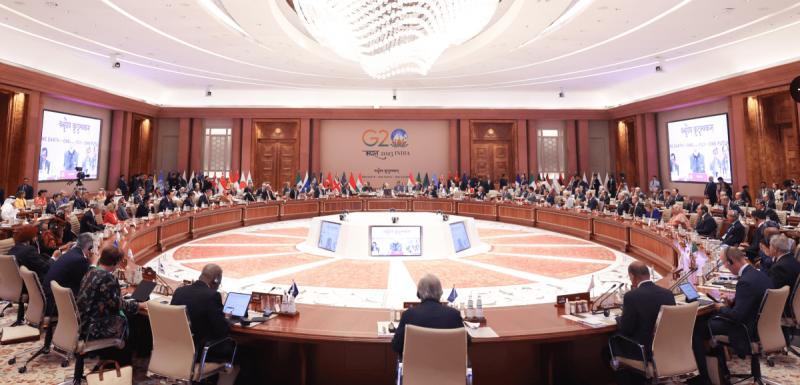New Delhi: A day before the end of summit, G20 members reached a compromise over the language over the Ukraine war, to allow for the release of a joint communique at the end of the summit, with India proposing a new text overnight which has led to a consensus.
Indian Prime Minister Narendra Modi announced that he wanted to convey the “good news” that consensus has been reached on the New Delhi Declaration. His news was reached by applause and thumping of desks.
The decision was announced unusually on the first day of the summit, without waiting for the conclusion of the two-day event.
Earlier, the G20 sherpa Amitabh Kant tweeted that there was “historical and path breaking G20 declaration with 100 percent consensus on all developmental and geo-political issues”.
“The new geo-political paragraphs area powerful call for Planet, People, Peace and Prosperity in today’s world. Demonstrates PM Narendramodi leadership in today’s world,” he posted.
According to diplomatic sources, the Indian side had circulated a new paragraph on Ukraine late at night.
A few minutes after the announcement, the New Delhi declaration was released – an unusual practice for a summit that has not ended.
The consensus text, which is also endorsed by Russia and China, expresses support for “sovereignty and territorial integrity” in the Ukraine war. However, it doesn’t have language from the Bali declaration which talked of “Russian aggression”.
“Concerning the war in Ukraine, while recalling the discussion in Bali, we reiterated our national positions and resolutions adopted at the UN Security Council and the UN General Assembly (A/RES/ES-11/1 and A/RES/ES-11/6) and underscored that all states must act in a manner consistent with the Purposes and Principles of the UN Charter in its entirety. In line with the UN Charter, all states must refrain from the threat or use of force to seek territorial acquisition against the territorial integrity and sovereignty or political independence of any stat,” said the Declaration.
Further, it added that “the use or threat of use of nuclear weapons is inadmissible”, a priority for the western countries.
The next paragraph, which is has been used in the Bali Declaration and subsequent outcome documents this year, stated, “Reaffirming that the G20 is the premier forum for international economic cooperation, and recognizing that while the G20 is not the platform to resolve geopolitical and security issues, we acknowledge that these issues can have significant consequences for the global economy”.
Last year’s G20 summit in Bali witnessed a consensus being reached at the last minute, with China and Russia endorsing two paragraphs on Ukraine.
But in a couple of months, countries withdrew their agreement to the paragraphs. That meant that when India started to hold the ministerial meetings under its presidency, not a single joint communique was issued. Instead, the paragraph related to Ukraine, which is based on the template of the Bali Declaration, were characterized as “Chair’s summary”, with Chinese and Russian objections to the text included as footnotes.
This article was originally published on The Wire.
Also Read: What Does The G20 Summit Hold For India?











